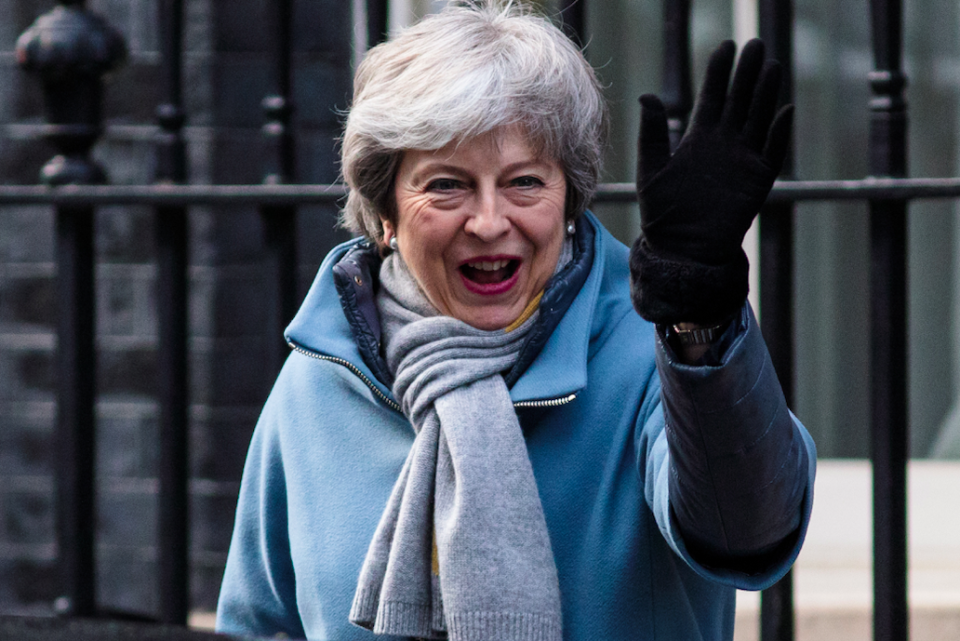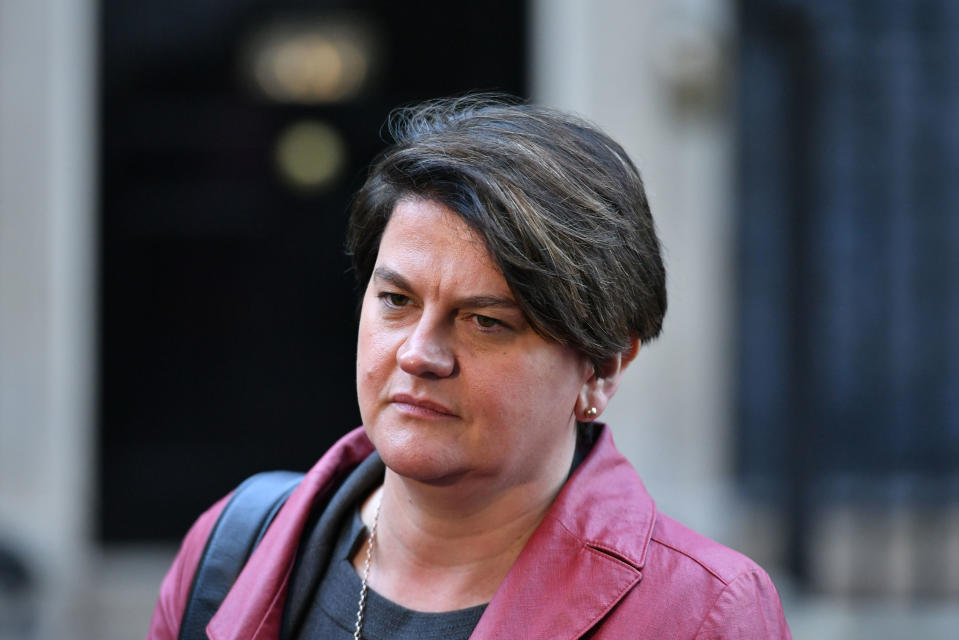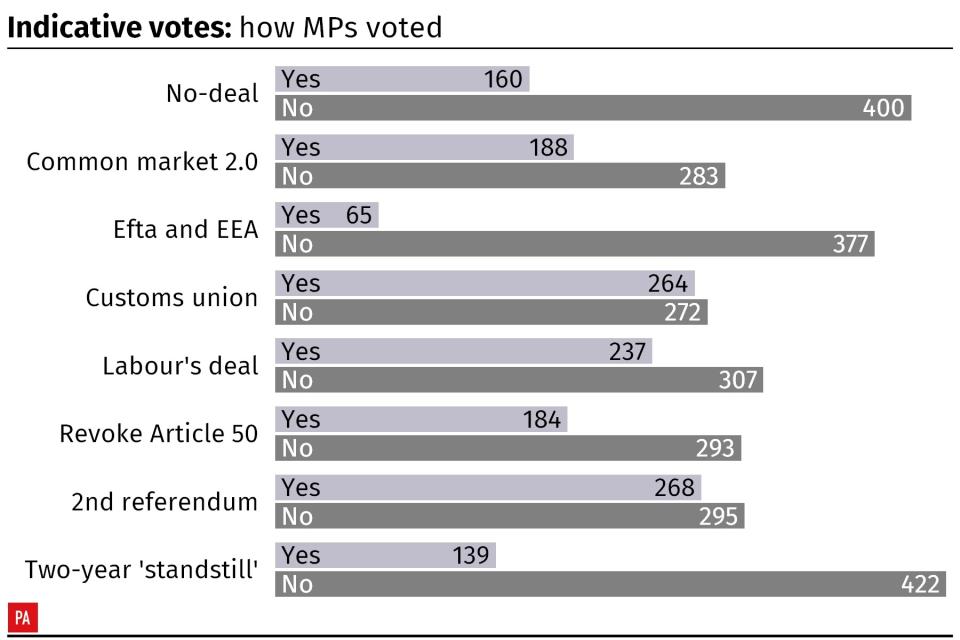Brexit crisis continues as Theresa May's offer to resign scuppered by DUP's refusal to support her plan
Britain lurched from crisis to crisis on Wednesday night as the Prime Minister and politicians from all parties failed to agree on how to move forward with Brexit.
On yet another remarkable night in the House of Commons, Theresa May vowed to fall on her sword if MPs back her Withdrawal Agreement.
However, within a couple of hours, the DUP had thrown her attempt back in her face, insisting there is no chance they will support her divorce deal.
The PM is reliant on their support – as well as hard Brexiteers within her own party – to secure a majority on her agreement.
Later, MPs embarked on a series of so-called ‘indicative’ votes to see if they could agree on a way forward.
But, as predicted, not a single of the eight options achieved a majority – although the prospect of a second referendum gained more backing from MPs than any other option.
Why was Theresa May’s night so bad (again)?
In a last-ditch effort to win backing for her deal, Mrs May offered to quit as Prime Minister.
In a move that she hoped would appeal to Brexiteers, including the influential Eurosceptic ERG, the PM told a private meeting of backbenchers: “I am prepared to leave this job earlier than I intended in order to secure a smooth and orderly Brexit”.

She said: “I have heard very clearly the mood of the parliamentary party. I know there is a desire for a new approach – and new leadership – in the second phase of the Brexit negotiations – and I won’t stand in the way of that.”
The move had appeared to work, with some reports suggesting it had resulted in a change of heart by big hitters including Boris Johnson.

But Mrs May’s hopes were dashed when the DUP said it would not support her deal.
DUP leader Arlene Foster said the party was unable to support the Withdrawal Agreement while it “poses a threat to the integrity of the UK” and “necessary changes we seek to the backstop have not been secured”.
Read more:
How the newspapers’ see Theresa May’s Commons defeat
Theresa May has ‘bottled it’ says Boris Johnson
These are the favourites to replace Theresa May
The news also threatens Mrs May’s hope for support from the ERG, whose chair Jacob Rees-Mogg had signalled he would back the deal if the DUP abstained.
When asked about the possibility of abstaining, the DUP’s Nigel Dodds told one journalist: “The DUP do not abstain on the Union.”

Where does that leave Theresa May?
If Mrs May’s deal passes, a Tory leadership election would start on May 22, with her staying in place until a new leader is decided – which could be as early as June or as late as September, depending on how the contest plays out.
Two MPs tipped to enter the Tory leadership race took to Twitter to pay tribute to the PM:
Prime Minister gave a dignified and honest speech at the 1922. She cares deeply about our country and is a patriot. People must now support the deal and move us forward.
— Liz Truss (@trussliz) March 27, 2019
Dignity, honesty & bravery from the PM tonight. We must maintain trust in our democracy and deliver Brexit. I urge all MPs to back the Deal so we can fulfil our promise to the British people
— Sajid Javid (@sajidjavid) March 27, 2019
Justice Secretary David Gauke said Theresa May made a “very touching, moving speech” as she pledged to step down.
Asked about a forthcoming Tory leadership contest, he told the BBC: “I think just at the moment there’s quite enough for MPs to be focusing on on Brexit, so I think really it’s what we should all be focusing on.”
But Anna Soubry, who has quit the Tories to join The Independent Group, branded her former colleagues’ willingness to back the deal purely in order to get ride of Mrs May as “exceptionally shabby”.
I think it’s an exceptionally shabby, appalling piece of behaviour of my former colleagues who are now going to vote apparently for her … purely and simply to get rid of the Prime Minister” @Anna_Soubry to @cathynewman on #Trexit pic.twitter.com/wbaBPAfUvN
— Hayley Barlow (@Hayley_Barlow) March 27, 2019

What happened with the ‘indicative votes’?
MPs had seized control of the House of Commons agenda to force votes on alternatives to Mrs May’s plan – including a call for a public vote on any deal and a demand for Parliament to choose between no-deal and no-Brexit if the UK gets within two days of crashing out.
But perhaps unsurprisingly, not one of the eight options achieved a majority, including Labour’s alternative Brexit plan featuring a permanent customs union with a UK say on trade deals and close alignment with the single market.
The prospect of a second referendum gained more backing from MPs than any other option, prompting The Independent Group spokesman Chuka Umunna to say “it’s all to play for”.
Green Party leader Caroline Lucas also pointed out that despite not obtaining a majority, the plan for a confirmatory public vote received more votes than the Prime Minister’s Brexit plan.
What do we know this evening: in a vote of the @HouseofCommons on resolving the #Brexit chaos, holding a #PeoplesVote commanded the most support! – more than the PM’s deal, Labour’s alternative deal, no deal, the Common market 2.0 or the others. It’s all to play for!
— Chuka Umunna (@ChukaUmunna) March 27, 2019
Public vote gets biggest vote – 268 in favour – and crucially gets more support than PM’s Deal last time (242)
Now Monday becomes key moment to attach #peoplesvote to any deal that gets more support— Caroline Lucas (@CarolineLucas) March 27, 2019
Ahead of the announcement of the results, MPs voted in favour of regulations linked to moving the date of the UK’s withdrawal from the EU from March 29 to May 22 if a deal is approved by March 29, or to April 12 if no deal is approved.
What about MV3?
Mrs May must table a motion for a third “meaningful vote” (MV3) on her deal by the end of Wednesday if it is to be debated on Thursday. If it comes any later, she would have to ask the Commons to sit on Friday March 29 – initially marked out for Brexit day and currently listed as a non-sitting day.
However, she will also need to persuade Speaker John Bercow that it is not a simple re-run of an earlier vote.
Mrs May’s official spokesman said: “If we are able to hold and win a vote this week, we would then be able to leave the EU in less than two months’ time with a deal, which the Prime Minister firmly believes is what the public wants.”

 Yahoo News
Yahoo News 

